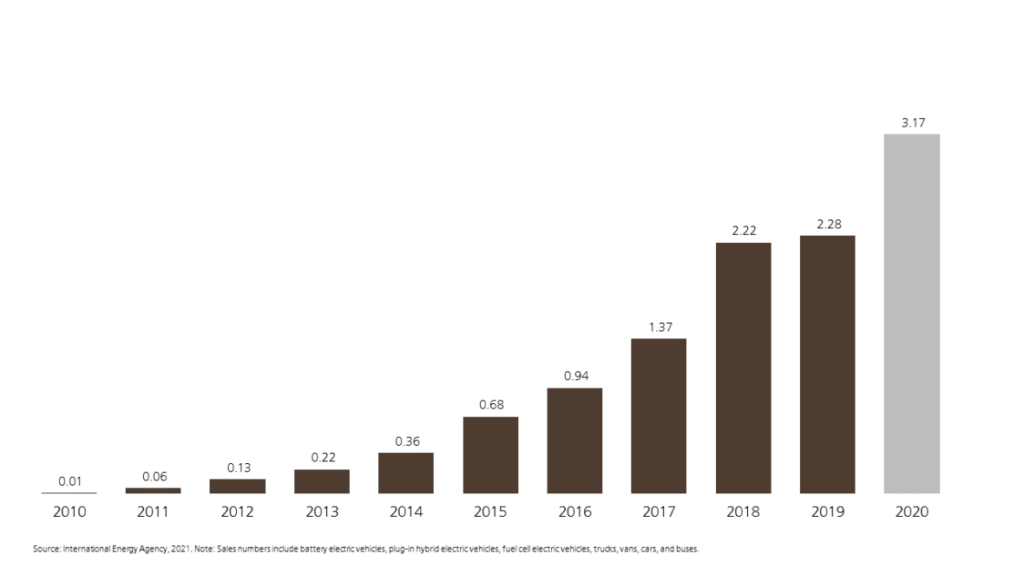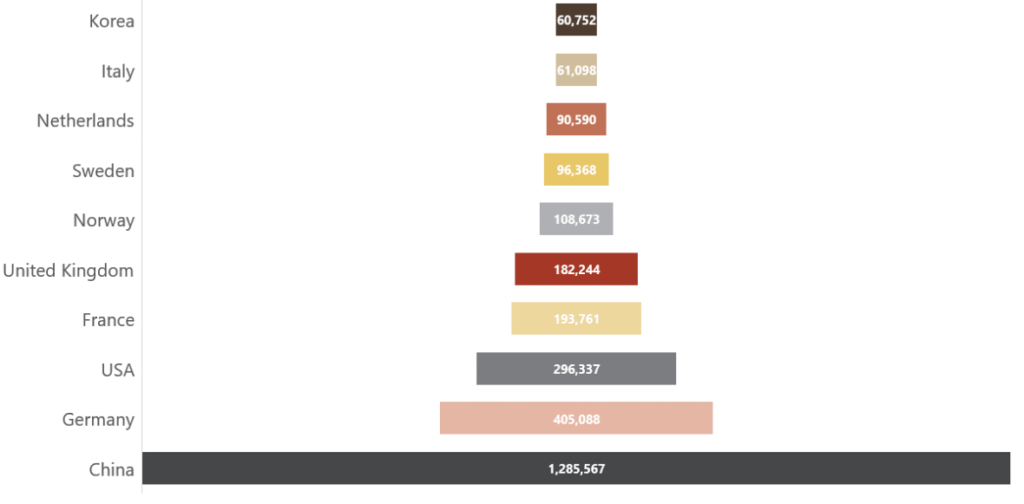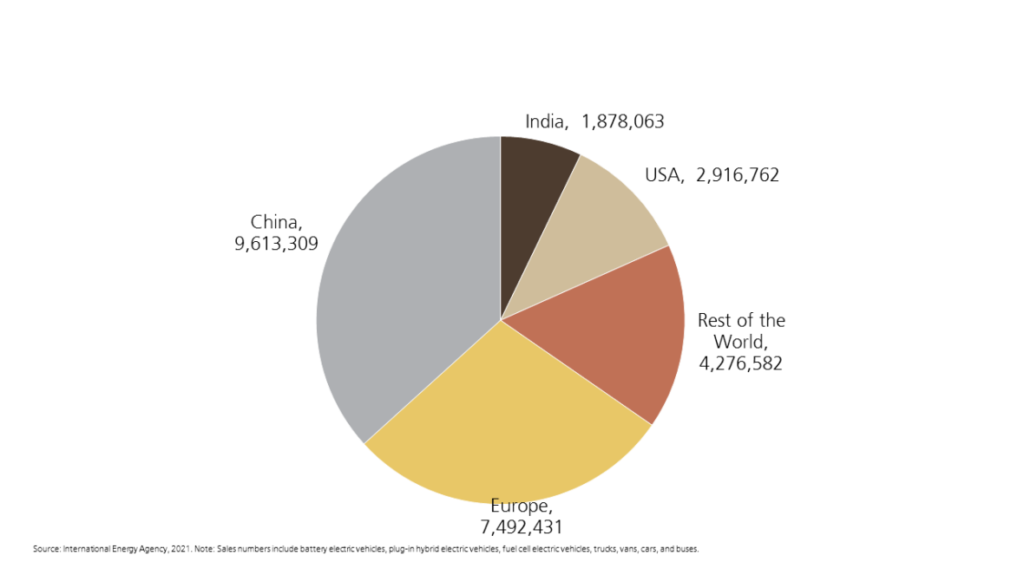Electric vehicles are leading the transition to a net zero economy and Asia will be a major market. Given the good growth prospects, where are the investing opportunities in Asia?
Electric vehicles and Asia investing - in 60 seconds
- Electric vehicle sales totaled 3.17 million in 2020, according to data from the International Energy Agency (IEA).
- China is the biggest electric vehicle market, with 1.29 million electric vehicles sold in 2020, up 8.3% y-o-y, and accounting for 40.5% of global sales in 2020, according to IEA data.
- By 2030, China is expected to be the world’s largest electric vehicle market, according to IEA forecasts of annual sales of 9.61 million units.
- From an investment perspective, valuations on some of the large-cap electric vehicle stocks look stretched, so investing in the electric vehicle theme via Asian small cap companies may offer an attractive entry point.
- We consider small cap companies that supply materials and housings for electric batteries, as well as lighting systems for electric vehicles, as potentially attractive investments in the electric vehicle space over the longer term.
If petrol engines drove the 20th century, then it’s likely that the 21st century will be electrically powered.
That’s because of an accelerating energy transition as consumers shift to electrically powered vehicles.
How many electric vehicles were sold globally in 2020?
Electric vehicle sales totaled 3.17 million in 2020, according to data from the International Energy Agency (IEA), almost 5x the total 682,845 electric vehicles sold in 2015.
Global sales of electric vehicles, 2010-2020 (millions of units)

But why are electric vehicle sales growing?
We see three distinct factors out of many, including rapid innovation, government policies, and changing consumer behavior amid rising awareness of climate change.
Where are the biggest electric vehicle markets?
China is the biggest electric vehicle market, with 1.29 million electric vehicles sold in 2020, up 8.3% y-o-y, and accounting for 40.5% of global sales in 2020, according to data from the International Energy Agency (IEA).
Top Ten Markets for Electric Vehicles by Sales in 2020
- China (1,285,567)
- Germany (405,088)
- USA (296,337)
- France (193,761)
- United Kingdom (182,244)
- Norway (108,763)
- Sweden (96,368)
- Netherlands (90,590)
- Italy (61,098)
- South Korea (60,752)
Source: International Energy Agency, 2021
Note: Sales numbers include battery electric vehicles, plug-in hybrid electric vehicles, fuel cell electric vehicles, trucks, vans, cars, and buses.
Top ten markets for electric vehicles by unit sales, 2020

Source: International Energy Agency, 2021
Where will the biggest electric vehicle markets be in 2030?
China is forecast to be the biggest market for electric vehicles in 2030, with estimated annual sales of 9,613,309 units, followed by Europe (7,492,431 units), Rest of the World (4,276,582 units), USA (2,916,762 units) and India (1,878,063 units), according to forecasts from the International Energy Agency (IEA).
Global electric vehicle sales: market share in 2030

Note: Sales numbers include battery electric vehicles, plug-in hybrid electric vehicles, fuel cell electric vehicles, trucks, vans, cars, and buses.
How to invest in the electric vehicles theme?
Given the strong prospects for the electric vehicle sector – and the expectation that Asian countries will be some of the leading markets – what opportunities are there in the Asia equities space?
We spoke to our expert portfolio manager Raymond Wong from the Asia Pacific Equities team to learn more.
Raymond Wong, Portfolio Manager, Asia Pacific Equities team
Why not invest in the pure play electric vehicle stocks in the large-cap universe?
We are not entirely sure who will be the eventual winners as the industry matures. Also, if you look at some of these large-cap electric vehicle stocks, we struggle to make the valuations work.
We need to project our earnings up to and beyond 2032 to justify some of the valuations today and, actually, we can’t really justify why to invest in a large-cap electric vehicle stock with a USD 70bn+ market cap which today generates zero revenue.

So rather than invest through the large caps, we believe we can play the electric vehicle thematic through some small-and mid-cap stocks.
Here are some examples.
Firstly, we invest in a South Korean company which is a material supplier to the Korean battery industry that is taking market share from Japanese suppliers.
Secondly, we also invest in a Chinese company becoming the global leader for battery housing for electric vehicle batteries. That company has beat out German peers to be the sole supplier for Volkswagen’s electric battery platform in Europe.
The third company is a Malaysian company that is taking market share in the automotive lighting sector. If you think about what is important for electric vehicle manufacturers, they need to focus on three things: energy efficiency, unique design and product differentiation. We believe lighting is going to be a key part of that.
So, while the electric vehicle is an attractive one, we feel that investing in it requires a nuanced approach. That’s where an Asia-focused equity strategy may provide not only more diversified exposure to the electric vehicle theme but also access to the many areas of growth that are associated with it.
Contact us to learn more about our Asia equity strategies and read more about our expertise in our wide range of thought leadership.

